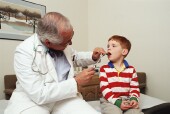- 8 Ways to Increase Dopamine Naturally
- 7 Best Breads for Maintaining Stable Blood Sugar
- Gelatin vs. Collagen: Which is Best for Skin, Nails, and Joints?
- The Long-Term Effects of Daily Turmeric Supplements on Liver Health
- Could Your Grocery Store Meat Be Causing Recurring UTIs?
- Are You Making This Expensive Thermostat Error This Winter?
- Recognizing the Signs of Hypothyroidism
- 10 Strategies to Overcome Insomnia
- Could Artificial Sweeteners Be Aging the Brain Faster?
- Techniques for Soothing Your Nervous System
Kids’ Checkups Should Include Cholesterol, Depression Tests, Doctors Say


Doctors should test middle school-age children for high cholesterol and start screening for depression at age 11, according to updated guidelines from a leading group of U.S. pediatricians.
Doctors should also test older teens for HIV, the AIDS-causing virus, the revised preventive-care recommendations from the American Academy of Pediatrics say.
The new screening schedule provides “the recommended content for a well-child visit,” said Dr. Joseph Hagan, co-editor of the guidelines. “Some changes are small, some will get people’s attention.”
The changes attempt to address several pressing health issues affecting U.S. families today. The nation’s obesity epidemic means that children are developing high cholesterol levels — a risk factor for heart disease — at earlier ages. And depression is linked to higher risk for teen suicides and murder.
“One in five kids will, at some point in time, meet the criteria for depression,” said Hagan, a professor in pediatrics at the University of Vermont College of Medicine.
Here are the most significant changes to the guidelines, published online Feb. 24 in the journal Pediatrics:
-
Depression screening at ages 11 through 21. If depression seems likely after asking suggested questions, doctors should assess its severity and make appropriate referrals to a social worker or psychologist for further evaluation and treatment. In some cases, a pediatrician might prescribe antidepressants, said Hagan.
The key question to ask parents of a child diagnosed with depression and suicidal thinking is if they have firearms in the home. “If the answer is yes, you have to ask parents to please remove the firearms to someone else’s home,” he said. “Do not try to lock them up. Or keep the ammunition separate from the gun. A smart, determined adolescent will get to them.”
-
Cholesterol screening between ages 9 and 11. Hormonal changes make it difficult to get an accurate cholesterol reading during adolescence, so the doctors’ group recommends screening before puberty’s onset.
Lifestyle changes, rather than medication, usually will be recommended to control elevated cholesterol levels, thus reducing potential heart risks, Hagan said. These include eating healthier foods and getting more exercise. A cholesterol screen at this age also can catch cholesterol conditions that are passed down from parents, Hagan said.
-
HIV screening between 16 and 18 years old. The earlier you diagnose someone with HIV, the sooner essential treatment starts, said Hagan. New medications can keep someone symptom-free for many years. “By diagnosing early, we can change the course of the disease,” said Hagan.
-
Critical congenital heart disease screening for all newborns. An oxygen saturation test called pulse oximetry should be performed on all newborns. Hagan said this is already the standard of care; the academy just formalized the recommendation.
-
No Pap smears and checking for precancerous cervical changes in girls before age 21. Research showed that it was “not unusual to find abnormalities,” said Hagan. The problem was, those abnormalities often never amounted to anything serious. But additional tests, such as biopsies, were frequently done, needlessly raising costs and anxiety.
Because the new recommendations “were carefully vetted for the presence of medical evidence, most insurers already cover them,” Hagan said. And they are also covered under most plans in the Affordable Care Act.
The updates didn’t come as a surprise, said one children’s doctor.
“Many of these changes were ones we anticipated,” said Dr. Kristin Hannibal, clinic director of the Primary Care Center at Children’s Hospital of Pittsburgh. “The major stumbling block is always how do we take these recommendations and implement them across the board.”
Formalization of the recommendations will make it easier to obtain insurance reimbursement, Hannibal said.
Hagan said that parents should feel empowered to ask their pediatricians if they’re following the Bright Futures guidelines.
“If a practice isn’t following the guidelines, parents can encourage them to do so,” suggested Hagan.
More information
Learn more about what to expect at well-child visits from the U.S. National Library of Medicine.
Source: HealthDay
Copyright © 2026 HealthDay. All rights reserved.










